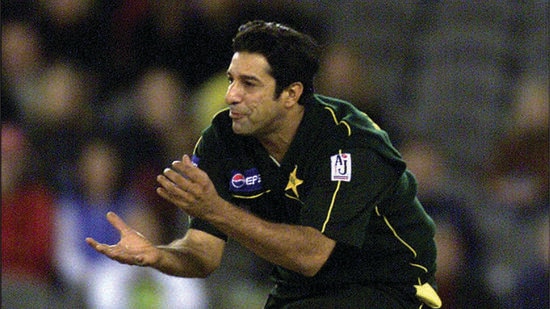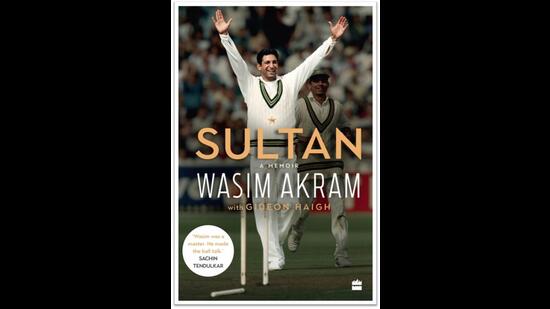Review: Sultan: A Memoir by Wasim Akram
The cricketer’s surprisingly honest memoir touches on everything including allegations of match-fixing, his struggle to handle fame, his addiction to cocaine, and the absence of a work-life balance that threatened his marriage
Pakistani cricketer Wasim Akram, who is known as the “Sultan of Swing” for being one of the best reverse swing bowlers in the world, has written a gripping memoir in collaboration with cricket journalist Gideon Haigh. It is worth reading because it is far from self-congratulatory. Akram comes across as a flawed and honest human being rather than a larger-than-life hero asking to be worshipped.

He is surprisingly candid with his admission of feeling inadequate when he was offered the captaincy of the Pakistani men’s cricket team. He writes, “I had no particular knack for managing people; I had no experience dealing with the media. I did not feel like I could say no, but I did not say yes with any confidence.” Since it is extremely common to come across men exaggerating their abilities at the workplace, it is charming to run into someone who openly addresses his lack of expertise and shares how he sought help.
Akram writes movingly about how he looked up to his senior Imran Khan for advice because he was “dumbfounded” when his appointment was announced. He had a particularly tough time “enforcing discipline” when colleagues were not punctual. Khan asked him to fine them for their recurring unprofessional behaviour. Akram did so, but not without going on a guilt trip. The book does an excellent job of capturing the roller-coaster of emotions – gratitude for the mentor, frustration at being taken for granted, and grappling with imposter syndrome since he did not believe in himself.
He also notes the various challenges he faced when he became a commentator because the role did not “come naturally” to him. He writes, “I struggled with the hours – commentators arrive earlier than players, work through breaks, and can never switch entirely off”. Having been what he describes as “an intuitive cricketer”, he was not accustomed to verbalizing many aspects of the game but he was lucky enough to find friends and colleagues from the cricketing world who made sure that they had his back.

Akram also opens up about some of the unflattering episodes from his career including allegations of match-fixing, his struggle to handle fame, his addiction to cocaine, and the absence of a work-life balance that threatened his marriage. He does not ask for sympathy or validation. He narrates merely for the sake of clearing the air. This seems like a good decision because he has had enough time to process his past.
Akram confesses that he was neither “a good husband” to his first wife Huma – who died at the age of 42 – nor “a good father” to his sons Tahmoor and Akbar. He writes, “I was the classic Punjabi male parent. I turned up occasionally scattering gifts but left the burden of child rearing to my wife. In fact, the boys probably saw more of Muhammad Abbas, our valued family helper, than they did of me.” He is now married to Shaniera.
It must have been hard to make himself vulnerable in this manner, knowing that there are people out there who could use this very information to judge him harshly and call him out. Perhaps this kind of rigorous self-examination can come only from someone who believes in genuinely taking responsibility for his own actions rather than trying to find another individual to blame. The benefits of hindsight are evident here. He must have had little time to pause at the peak of his career when he was high on success.
Hopefully, Akram’s personal unpacking of how patriarchy sneaks into relationships will encourage many readers to analyse their own conditioning. He writes, “I had developed the traits of selfishness and laziness endemic to athletes, so used to having things done for them, so used to being the most important person in every room.” By sharing his story, Akram shows how a glamorous life comes with a huge emotional cost attached to it. He speaks for many couples wherein the wife has to sacrifice her needs, interests, and desires because the celebrity husband expects nothing less than royal treatment.
Akram’s self-critical approach is balanced in the book with quotes from fellow cricketers who have seen his game at close quarters over a long period of time. They emphasize his tremendous strengths as a player. Allan Border, for instance, writes, “I hold Wasim Akram in the highest regard. So much so that if there is reincarnation, I would want to come back as him! Not only a great bloke, but probably the greatest left-arm quick the cricket world has seen.” Justin Langer adds, “Facing Wasim was like batting in a fishing net. You couldn’t go anywhere. You couldn’t score. Basically, it was a nightmare.”
This book is also special because it celebrates the camaraderie between Indian and Pakistani cricketers off the field from a time much before Virat Kohli and Babar Azam came on the scene. Recalling a match between India and Pakistan in Sharjah in April 1986, Akram writes, “Imran and Sunil Gavaskar were very close. I made a pal in Ravi Shastri, a Gemini like me, and great company”. In this book, Anil Kumble calls Akram “a wonderful fast bowler whose reverse swing terrorised some of the greatest batters of our time and some mere mortals like us in the lower order”. Sachin Tendulkar adds, “...when you play against someone of that calibre, it lifts your game as well.”
Sultan: A Memoir also throws light on Akram’s fondness for India. His father was born in Chawinda Devi, a village on the outskirts of Amritsar, and migrated at the time of Partition. Akram points out that only five percent of the 104 test matches and 356 one-day internationals that he played during his almost 20-year-long career were in India. He adds, “Perhaps I should consider myself lucky to have played so many.” He thinks that politics makes it difficult to imagine a scenario wherein Pakistanis will play cricket in India but he also wants to believe that “a miraculous thaw is possible”.
These sparkling moments will certainly win the hearts of Indian fans. Akram also writes about actor Shah Rukh Khan’s kindness after the cricketer got out of rehab. Khan gave him a job as the bowling coach at Kolkata Knight Riders”. Due to the deteriorating ties between India and Pakistan, it was not feasible for a Pakistani coach to continue working in India but Akram continues to have great friends here. He wistfully writes, “The daily hatred on social media saddens and baffles me. It’s horrendous that it has come to this when the two nations have so much in common, not least cricket.”
While this book has a serious tone, it also has its funny moments. Once when the Pakistani team was in the Caribbean to play cricket, Akram ended up giving a press interview wherein he said that he occasionally had beer but, on that particular trip, he drank rum. In order to assure readers that he was not in the habit of drinking regularly, he added, “We normally drink milk in the dressing room after a day’s play.” His earnest attempt at being forthright backfired quite badly in Pakistan since alcohol is considered haram in Islam. He writes, “The bad publicity only abated when we started the series well, knocking the West Indies over for 127 on the first day, taking all 10 wickets for 63.”
Chintan Girish Modi is a freelance writer, journalist and book reviewer
The views expressed are personal
All Access.
One Subscription.
Get 360° coverage—from daily headlines
to 100 year archives.



HT App & Website







